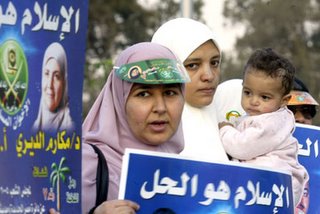 Obtained from Middle East Online
Obtained from Middle East Online2005-12-13
Muslim Brotherhood adopts step-by-step strategy toward power, sending clear message about its potential future strength
By Selim Saheb Ettaba
CAIRO - Egypt's Muslim Brotherhood is seeking to avoid a confrontation with President Hosni Mubarak's regime after its step-by-step approach scored big in parliamentary elections, analysts said.
Winning 88 seats despite fielding candidates for only around a third of those contested, the banned Islamist movement achieved a success rate topping 50 percent and sent out a clear message about its potential future strength.
"The Muslim Brothers refrained from fielding candidates against ministers and key men in the regime in order not to provoke it," said Amr Shubaki, an analyst from the Al-Ahram Center for Political and Strategic Studies.
"They will try not to confront the regime in a direct and too obvious a way in parliament," he predicted. "Criticism, discussions? Sure, but without going for a full-blown confrontation," Shubaki said.
Hala Mustafa, chief editor of the Al-Dimuqratiya review, said this cautious approach had allowed the Brotherhood to support calls for greater democracy while foiling attempts to demonise the Brotherhood in the eyes of the West.
She noted that Western powers had expressed their willingness to engage in contacts with the movement.
"They will continue to seek the confidence of the international community and present themselves as a moderate political force, a moderate alternative," Mustafa said.
But Nabil Abdel Fattah, also from the Al-Ahram Center, said the movement will have to change to earn more credibility.
"In the next parliament, they will have to stop playing the same silly game," he said, in reference to the Brotherhood's systematic questioning of writings they deem blasphemous or anti-Islamic.
They should focus on "criticising and attempting to change the autocratic legacy of the regime, including the state of emergency, and support constitutional reform," Abdel Fattah said.
The Muslim Brothers were absent from the campaign for the September presidential election, which their status as an officially banned organisation did not allow them to contest.
But since their spectacular gains in the month-long parliamentary polls that wound up last week, they have openly talked about their intention to obtain power from the ballot box.
"The new parliament will probably propose a new constitutional amendment," Brotherhood leader Mohammed Mehdi Akef said Sunday, urging his MPs to "restrict the limitless powers granted to the president" and limit his mandate to two terms.
He also conditioned his movement's participation in the next presidential election -- scheduled to be held in 2011 -- on the abolition of the state of emergency which has been in place since 1981.
Four months after a constitutional amendment was approved in May, Egypt held its first pluralist presidential election, in which Mubarak won a fifth six-year mandate with 88 percent of the vote.
While legal parties need only five percent of parliament to field a candidate, an independent requires the signatures of at least 65 members of parliament, 25 members of the consultative council and 10 municipal council members from at least 14 provinces.
The Muslim Brothers are not waiting for a legalisation as a political party which might never come and are "already preparing for the next presidential poll," Shubaki said.
"They already have the 65 MPs needed and now they will try to have the necessary number of elected officials in the consultative and municipal councils."
No comments:
Post a Comment